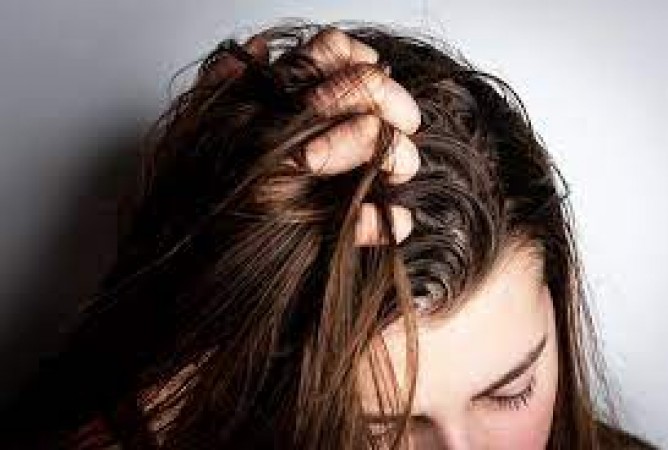
The sebaceous glands on our scalp produce natural oils known as sebum. Sebum is essential for maintaining healthy hair and skin, but excessive production can lead to an oily scalp and greasy hair.
Hormonal Imbalance
Hormonal fluctuations, particularly during puberty, pregnancy, or menopause, can trigger increased sebum production, leading to oily scalp and hair.
Overwashing or Underwashing
Washing your hair too frequently can strip away natural oils, prompting the scalp to produce more sebum to compensate. On the other hand, underwashing can lead to the buildup of oils and dirt on the scalp.
Environmental Factors
Humid weather and pollution can contribute to the accumulation of oil and dirt on the scalp, exacerbating the problem of oily hair.
Prevention: How to Keep Oily Scalp and Greasy Hair at Bay
Use the Right Shampoo and Conditioner
Choose shampoos and conditioners specifically designed for oily hair. Look for products that are sulfate-free and contain natural ingredients like tea tree oil or peppermint, which can help regulate sebum production.
Adjust Washing Frequency
Find the right balance for your hair type. Washing your hair every other day or every two days can help maintain a healthier scalp without overstimulating sebum production.
Avoid Overbrushing
Brushing your hair too frequently can spread the oil from the scalp to the hair strands, making them greasy. Limit brushing to when necessary and opt for a wide-tooth comb to detangle hair gently.
Choose Hair Products Wisely
Avoid heavy styling products like gels and serums that can weigh down your hair and make it look oilier. Opt for lightweight, water-based products instead.
Use Dry Shampoo as a Quick Fix
Dry shampoo can be a lifesaver on days when you can't wash your hair. It absorbs excess oil and adds volume, giving your hair a fresh appearance.
Solutions: Managing Oily Scalp and Greasy Hair
Apple Cider Vinegar Rinse
Apple cider vinegar helps balance the scalp's pH level and remove excess oil. Mix one part apple cider vinegar with two parts water, and use it as a final rinse after shampooing.
Tea Tree Oil Scalp Massage
Tea tree oil has natural antibacterial properties that can help reduce scalp inflammation and excess oil. Dilute a few drops of tea tree oil with a carrier oil and massage it into your scalp.
Aloe Vera Treatment
Aloe vera soothes and nourishes the scalp while controlling oil production. Apply fresh aloe vera gel directly to your scalp and leave it on for 20 minutes before rinsing.
Egg White Hair Mask
Egg whites can help absorb excess oil from the scalp. Whisk two egg whites and apply them to your scalp, leaving them on for 15 minutes before rinsing.
Clay Hair Mask
Clay masks can effectively draw out impurities and excess oil from the scalp. Mix bentonite clay with water to form a paste and apply it to your scalp. Rinse thoroughly after it dries.
Dietary Changes to Promote Healthy Hair and Scalp
Increase Water Intake
Staying hydrated is essential for overall health, including the health of your scalp and hair. Drink plenty of water daily to keep your scalp hydrated.
Consume Omega-3 Fatty Acids
Omega-3 fatty acids found in foods like salmon, chia seeds, and walnuts nourish the scalp and help control oil production.
Incorporate Biotin-Rich Foods
Biotin is a B-vitamin that promotes healthy hair and scalp. Include biotin-rich foods like eggs, almonds, and sweet potatoes in your diet.
Reduce Dairy and Processed Foods
High consumption of dairy and processed foods can trigger excess oil production. Opt for a balanced diet with plenty of fruits and vegetables.
Lifestyle Habits for Oily Scalp and Greasy Hair
Stress Management
Stress can worsen oily scalp conditions. Practice relaxation techniques like meditation or yoga to reduce stress levels.
Regular Scalp Massages
Massaging your scalp regularly improves blood circulation and helps distribute natural oils evenly.
Avoid Touching Your Hair Frequently
Touching your hair too often can transfer oil from your hands to your hair, making it greasier.
Protect Your Hair from Sun and Pollution
Wear a hat or use hair products with UV protection to shield your hair from sun exposure and environmental pollutants.
Hair Styling Tips for Oily Scalp and Greasy Hair
Embrace Hair Updos
Updos not only keep hair off the face but also help hide greasiness and add volume to the hair.
Experiment with Different Haircuts
Shorter haircuts can make oily scalp and greasy hair less noticeable.
Use Hair Accessories Strategically
Headbands and scarves can be stylish ways to manage oily hair while adding flair to your look. Dealing with an oily scalp and greasy hair requires a combination of preventive measures, natural remedies, and lifestyle adjustments. By understanding the causes and adopting effective solutions, you can regain control over your scalp and hair health. Remember to choose the right hair products, maintain a balanced diet, and incorporate stress-relieving practices into your daily routine.
Information Access: A World without the Internet
When to Begin Preparing for a Job Interview?
Amazon Freedom Sale to soon uplift in August with great Proffers this year